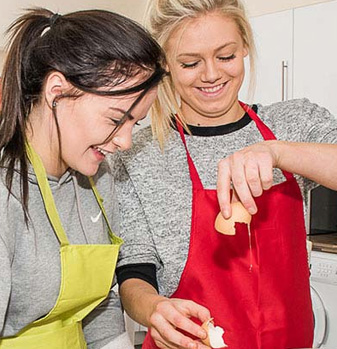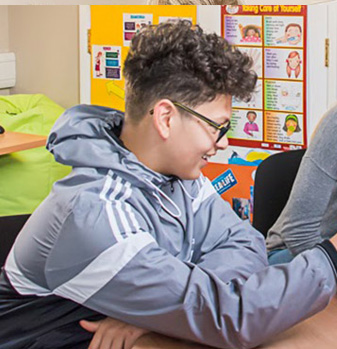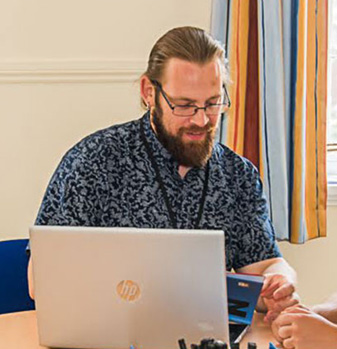Colleague Stories

Dominique O’Connor
My journey within the company has been ten years. I started as a support worker in 2012, working at several homes before becoming a senior then moving to a six-bed home for boys. I continued my development within the company becoming a physical restraint instructor, which enabled me to travel around to different parts of the city to meet new people, educating new starters about the importance of building relationships with these young people and how important the small wins are.
I was then promoted to Deputy Manager which I did for over a year, whilst supporting other homes in the cluster. I was then given the opportunity to complete my level 5 and become a Registered Manager of two homes Swan and Dove.
Every day I am grateful to be given the opportunity to make a difference – no matter how big or small.
Craig Whitchurch
Prior to working at Homes2Inspire, I worked in the prison sector and fitness industry. I decided I wanted to have a more meaningful career supporting others and to be a positive role model. I applied for the role as a night support worker in a six bed children’s home with no prior experience.
The organisation supported and trained me to develop and work effectively in my role and I have enjoyed being able to give children and young people different experiences. Through the consistent support and training I was able to develop in the organisation from Night Support Worker to Senior Support Worker to Home Manager. I am now a Regional Operations Manager within the organisation.
Anon
I had originally started working with adults who had mental health concerns, however after hearing from other participants about a job working with vulnerable young people there was something that made me feel that was the pathway for me rather than working with adults. As someone who had a traumatic childhood, being brought up in a family of addiction, and as a child who regularly witnessed domestic violence from a young age, I understood what it was like to be involved in the care system. My own experiences made me reflect and ask the question; who was my role model, key person and professional support network? For me, there wasn’t anyone significant that I could look back on that had any impact in the most difficult time of my life. I felt completely alone. I didn’t want other young people to feel this way.
At that time, I had just finished my GCSE exams. I remember finishing my last exam and being told I was moving to a hostel, where 3 people would be living with me.
We were all assigned a support worker, but one thing that really sticks with me is that there are no positive memories of how I was supported. I felt like I was left alone to fend for myself. I was only 15, and on benefits. For many years this meant I drifted, I had meaningless jobs but took upon myself to educate myself further. I enrolled at college and took it upon myself to better myself.
Through my own personal experiences, I knew this was a job I could relate to and strive to give children opportunities and relationships that I never had.
I started my journey as a Support Worker when I was 23 and Loved it! I had some influential managers that supported me to progress into a senior role before being promoted to a Deputy Home Manager. This progression gave me more autonomy to implement changes in the homes, and to the young people’s experiences of being in care.
I used my own experiences to highlight to young people, they have the same opportunities as someone who isn’t a child in care, and ensure they know they are worthy of good things happening. Being in care does not have a reflection on your own self-image. As a young person who has been looked after I recognise not having significant family relationships this can make you doubt your own identity and I wanted to change other young people having these same feelings I had to overcome.
I am now 32 and still love working for Homes2Inspire. Supporting young people and staff.
I have been given opportunities to achieve qualifications that I never thought I would be able to. I feel I have made my family proud. When I achieved an employee of the year award, my grandad framed this on his wall. I am very proud of my own achievements considering the path that I could have taken.
In my life, Homes2Inspire has been the most consistent I have ever had, and I believe in the reasons why we continue to do the good work we do – however tough it may get.
Matt Earnshaw
I have always had a passion to work with people and gravitated towards roles with children and young people. Before my time at Homes2Inspire I had a range of jobs, including detached youth work, running a youth centre and outreach work with homeless young people.
Homes2Inspire had a pull factor for me as it sounded rewarding – giving me the chance to make a real difference. Since joining eight years ago, it continues to be exactly the role I signed up for, with children at the forefront of what we do.
I have gained some great friends over this time and had amazing experiences. I have learned a lot about myself, including how nurturing and supportive I can be.
I have also reconnected with my competitive side, which has allowed me to get the best possible outcomes in inspections and for the children in our care.
What’s next? … I hope to continue to grow and develop in my role, as well as looking forward to furthering my progression within the organisation as it expands.
Outside of work I’m soon to become a father for the second time, so exciting times on the way!
India Pritchard
My journey from support worker to education and careers coordinator required a great deal of hard work. When I first began at my home, I was given the responsibility of coordinating our young person’s (S) education. S was not open to engaging in education and rarely attended her online tutoring sessions (mainly through health reasons). Although, I began to help steer her in the right direction through mentoring and support. I had the delight of meeting Paul Maginnis shortly after being given the Education Champion Role and he gave me guidance on how to complete the role. In particular, he gave me task of implementing ASDAN Semi Independence at Sudbury House (Personal Development Programme).
From the beginning, S was not keen on the idea of this qualification, but I asked her to think about this in a way that help fulfilled her aspirations. The timing of the tasks to be completed would be on her terms (to relieve pressure) and I incorporated fun into the tasks to make it feel like less of a chore for her. Ultimately, this made her overall engagement much more positive. This was a massive commitment; one I enjoyed and was determined to help her achieve.
Working together, I began recording the evidence via a word document. We collectively picked modules that were appropriate and ones that the yp would enjoy.
Within three months we hit a 3,000-word evidence ASDAN project (this is still ongoing, soon to be completed). We had gone from little to no engagement to a potential silver ASDAN award. I firmly believe that if the commitment is there, paired with a professional relationship, young people will engage better. It was important that S and I shared a good relationship as reaching this point would have been much more difficult. S now enjoys completing her ASDAN tasks and does not avoid the subject now, three months ago it was a different story. I was commended by a lot of my colleagues and managers – it then sunk in how far we had come.
Due to my commitment to education, I began taking on greater responsibilities such as reaching out to key stakeholders within the education sector to give her the highest level of opportunity to be placed within a post 16 placement most suitable to her needs. Additionally, with the support of my deputy manager I was then trusted to edit the yp’s Education Health Care Plan (EHCP) to provide more relevant information that reflects her current needs. It became clear that her EHCP was being used to reject her by various post-16 provisions, Paul gave me the task of going through the EHCP and challenging any wording that was out of date or no longer relevant.
Being given these roles within the home helped me to realise that I was capable of working as an Education and Careers Coordinator. I have the capability to support young people with their education and can empathise with them greatly when they may discover hardship. Young people in care already face many disadvantages in life, their education, employment and/or training should not be another difficulty they have to face. I seek to be that lifeline and to encourage them that they are worthy of whatever they want to achieve or aspire to be.
A day in the life of:
Jade Sargent – Residential Home Manager
Well, where do I begin! Every day is different in being a Home Manager and most of the morning is catching up with the staff and children from the night or weekend before. In my house there is tea and a lot of laughter first thing, with a little added dash of ‘organised chaos’.
Being the Home Manager is all about leading and guiding the team to the best possible outcomes for our children, having positive relationships with everyone and a lot of nagging! I go through the checks and inputs from over the weekend and it always makes me laugh and smile when I read what our children have been up to.
The best part of being a Home Manager is the daily reflection of how far your team and young people are growing, this could be the smallest success, such as they have finally managed to tidy their room or achieving greatness by attending their first day of work. I love to see our staff come on in leaps and bounds, finding their niche areas, and pushing their passion into supporting the young people in the home. Every day is different, but the passion and care remain consistent.
A day in the life of:
Toby Shears-Brown – Project Service Manager
Working in supported accommodation for leaving care is a lot different to working in a residential environment. The care-leavers are a lot more independent and need less individual support, however working with up to 19 different care-leavers can be challenging.
Staff support care-leavers through 1:1 support, workshops, and activities. Staff have various other duties dependent on their role. These include things such as CCTV monitoring, dealing with maintenance issues, cleaning, tracking outcomes, supporting education and employment, and assisting with housing outcomes. The list is very wide ranging, but the most important thing is just being there for them and listening to what they have to say. Support can be a five-minute chat with a cup of tea or can be a supporting them for several hours when they are at their lowest.
There are many things you can say about working with care-leavers, such as challenging, rewarding, difficult, but boring never enters the conversation.











